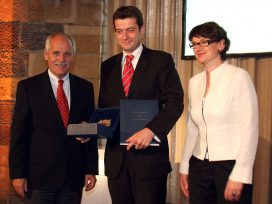The Dalai Lama as political institution is both powerful and vulnerable: powerful because political authority is supported by religious devotion; vulnerable because it is at odds with the political realities of Tibetans today. The Dalai Lama himself has suggested the institution may have outlived its usefuleness.
Articles
Read more than 6000 articles in 35 languages from over 90 cultural journals and associates.

From slave to sex worker
Feminist debates and prostitution politics in the Netherlands 1880-2000
Today’s approach to prostitution in the Netherlands reflects the currency of the concept of “agency” advocated by feminists since the 1980s. Yet while defining prostitution as “sex work” implies entitlements, it also glosses over gendered inequality, writes Petra de Vries. Can the abolitionist arguments of the nineteenth century provide the basis for an alternative?
Multiculturalism at its limits?
Managing diversity in the new Europe
Multiculturalism, the default strategy in western Europe for managing cultural diversity in recent decades, is increasingly under attack. In a mainstream discourse closer to that of the far-Right, minorities are turned into problems as migration allegedly threatens cultural identity. Liberal critics, on the other hand, see a threat to Enlightenment values when the appeasement of religious and cultural sensibilities is regarded as more important than the right to freedom of expression or gender equality. In central and eastern Europe, the experience is different: because minority rights are largely seen in national-territorial terms, collective rights are viewed with suspicion, while other minorities, notably the Roma, are sidelined entirely. British writer Kenan Malik met Slovak politician and journalist Fero Sebej in Bratislava to discuss multiculturalism in the East and in the West. Moderated by Samual Abrahám, editor of the journal Kritika & Kontext.
Discussions of scientific innovation are haunted by images of Frankenstein’s monster or Faust’s diabolic pact, says Philip Ball. We will never have an honest and open debate about in vitro fertilization or cloning until we can distinguish mythical fears from real and present dangers.
Remembering Bartók
John Moseley talks with Elisabeth Klein
“He made very few comments and never about technical problems. I once asked about a particular fingering and he replied ‘Use your nose if you like.'” Shortly before her death, the pianist Elisabeth Klein talked to composer John Moseley about her former teacher Béla Bartók.

Too close for truth
Political interference in the French media
The present French government has a profoundly ambivalent relationship with journalists and the press. President Nicolas Sarkozy has encouraged the public to treat journalists with mistrust; at the same time, his relationship with those who own the press is far too close, says the secretary-general of Reporters Sans Frontières.
Cracks in the fortress
The political conflict over Dutch public service broadcasting
Accusations of “leftwing bias” coincide with the announcement of 200 million euro cuts to Dutch public radio and television budgets. If the government has its way, it could inflict the final blow to The Netherlands’ chaotic but unique broadcasting system, comments Angelo van Schaik.
Restoring reality
The resurgence of investigative journalism in Italy
In a surprising reversal of fortune, investigative journalism is enjoying a comeback in Italy. No longer can Prime Minister Silvio Berlusconi’s media empire dictate the terms of debate or protect Il Cavaliere and his cronies from growing public anger.
The new boys in Europe
Why are the super-rich bankrolling the press?
Respected but bankrupt European newspaper titles such as Le Monde in France, El Pais in Spain and the Independent in the UK have recently been sold to business tycoons unconnected with the media. Their motives are debatable, but the ones to watch are the Russians says Irena Maryniak.
Diversity's future
Public service broadcasting in a digital Europe
As the great digital switchover moves ever closer, the threatened loss of Public Service broadcasting becomes a matter of concern to those interested in diversity of programming. Petros Iosifidis provides an overview of European debates on PSB, pointing out marked differences in approaches to its structure, funding and content.
Farewell Fourth Estate?
How the UK press has abandoned its ideals
To a very considerable extent, the UK’s national daily press is dominated by rightwing owners for whom “public interest” simply means “if we can sell it, we’ll tell it”. Can the the British press continue to be dignified with the epithet “Fourth Estate”, traditional watchdog on power and guardian of the people?
Scapegoater hunted down as a witch
Geert Wilders and the Dutch press
Judgmental journalism directed at members of parliament is an orchestrated form of “mob-justice” in the Netherlands today. Self-appointed media watchdogs present a bigger danger to society than the persons they pursue, writes Tjebbe van Tijen.

Giving racism an easy ride
The French media's response to Sarkozy's "law and order" clampdown
It has been five years since the spectacle of violent confrontation in the French banlieues. But despite promises made at the time, little seems to have changed either in government attitudes to migration or the media’s coverage of migrant issues. This time round, writes Mogniss H. Abdallah, it is the Roma who are in the firing line.
A press fit for the purpose?
Finding a new model for press and public service broadcasting
Despite the Internet’s growing significance as vehicle of freedom of expression, public service broadcasting and the printed press will remain for some time the visible face of the watchdog on power. In western Europe, the traditional media need to prove they are still capable of performing this role, writes Judith Vidal-Hall.
A return to news?
The Irish press after the crash
When the Celtic Tiger roared ahead, foreign media owners rushed in to take advantage of burgeoning advertising revenues. They failed to warn of the impending disaster and now, in the wake of the collapse, are leaving the country. Irish readers, meanwhile, are turning back to tried and trusted domestic voices, writes Michael Foley.
Europe’s collective memory is as diverse as its nations and cultures and cannot be regulated by official acts of state or commemorative rituals, writes Claus Leggewie. The most significant challenge for a European memory is to reconcile “competing” memories of the Holocaust and the Gulag. Yet other historical experiences must also be integrated: memories of wartime and expulsion, of colonialism and immigration, and not least of the “success” of the European Union.